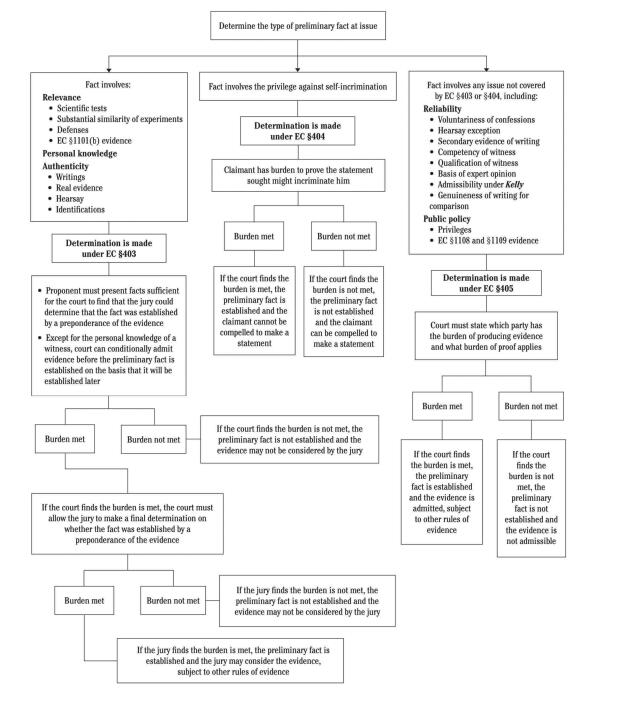Chapter 7 - §3. Types of preliminary fact determinations
| Jurisdiction | United States |
§3. Types of preliminary fact determinations
While the basic procedure for determining a preliminary fact issue is governed by Evid. C. §402, the burden of proof required to establish the preliminary fact and the effect of the court's determination depend on the type of preliminary fact at issue. Depending on the preliminary fact at issue, the fact determination may be governed by Evid. C. §403, 404, or 405. The Evidence Code provision that applies will dictate the proponent's burden of proof and the effect of the court's determination. Chart 7-1, below, illustrates how a particular preliminary fact issue is resolved under these provisions.
7-1. Preliminary Fact Determinations

§3.1. Fact determinations under Evid. C. §403. If the admissibility of proffered evidence depends on a preliminary fact involving relevance, personal knowledge, or the authenticity of the evidence, the fact determination is governed by Evid. C. §403, and the court has a duty to instruct, on request, that the jury determine whether the preliminary fact exists before it considers the evidence introduced. See People v. Westerfield (2019) 6 Cal.5th 632, 725.
1. Standard subject matter.
(1) Relevance. When the relevance of proffered evidence depends on the existence of a preliminary fact, the determination of that preliminary fact is governed by Evid. C. §403. See People v. Nieves (2021) 11 Cal.5th 404, 446; People v. Melendez (2016) 2 Cal.5th 1, 23. Some of the circumstances in which this applies include the following:
(a) Forensic tests. See People v. Pizarro (5th Dist.2003) 110 Cal.App.4th 530, 542-43, disapproved on other grounds, People v. Wilson (2006) 38 Cal.4th 1237. See "Forensic tests," ch. 1, §4.13.
(b) Substantial similarity of experiments. People v. Bonin (1989) 47 Cal.3d 808, 847. See "Substantially similar conditions," ch. 2, §7.1.1.
(c) Defenses to charges. E.g., People v. Galambos (3d Dist.2002) 104 Cal.App.4th 1147, 1157 (applying Evid. C. §403 to determine relevance of Compassionate Use Act of 1996 (Prop 215) as defense in marijuana cultivation case); see, e.g., People v. Tafoya (2007) 42 Cal.4th 147, 165 (applying Evid. C. §403 to determine if D knew that prosecution witness had a reputation for being dangerous in order to determine if D's self-defense claim was relevant).
(d) Other-acts-or-offenses evidence under Evid. C. §1101(b). See People v. Bryant (2014) 60 Cal.4th 335, 371, 435-36; People v. Dryden (6th Dist.2021) 60 Cal.App.5th 1007, 1021-23; People v. Winkler (3d Dist.2020) 56 Cal. App.5th 1102, 1144. See "Character evidence of other acts offered for nonpropensity purposes," ch. 4-A, §4. This includes the identity of the person who committed the other act or offense. People v. Cottone (2013) 57 Cal.4th 269, 284.
Under Pen. C. §190.3, the prosecution can present evidence at the penalty phase of a trial showing the presence of a criminal activity by the defendant involving the use or attempted use of force or violence or the express or implied threat of force or violence. The question of whether the act actually occurred is a factual matter, but the characterization of those acts as involving an express or implied use of force or violence (or a threat of force or violence), and whether such acts are in fact a crime, are legal matters properly decided by the court. People v. Sivongxxay (2017) 3 Cal.5th 151, 192.
(2) Personal knowledge. When the preliminary fact issue is the personal knowledge of a testifying witness, the determination of that preliminary fact is governed by Evid. C. §403. See People v. Sanchez (2019) 7 Cal.5th 14, 62-63; Gamboa v. Ne. Cmty. Clinic (2d Dist.2021) 72 Cal.App.5th 158, 169. These determinations often arise when a party seeks to challenge a lay witness's personal knowledge. See "Personal knowledge," ch. 2, §1.1.2. They may also occur when a party seeks to admit a dying declaration, which requires a showing of personal knowledge on the part of the person testifying about a person's dying declaration. See "Exception—Dying declaration," ch. 3-B, §19. A trial court can exclude the testimony of a witness for insufficient personal knowledge only if no jury could reasonably find that the witness has such knowledge. See People v. Johnson (2018) 6 Cal.5th 541, 583 (although witness's statements about whether she was present at shooting were vague and inconsistent, court did not abuse its discretion in admitting her statements; jury ultimately determines credibility).
While personal knowledge of the witness testifying about a dying declaration is governed under Evid. C. §403, the relevant personal knowledge of the declarant (i.e., that death was imminent) is governed by Evid. C. §405. See People v. Chapman (2dDist.1975) 50 Cal.App.3d 872, 879.
(3) Authenticity. When the preliminary fact issue is authenticity, the determination of that preliminary fact is governed by Evid. C. §403. See Hart v. Keenan Props, Inc. (2020) 9 Cal.5th 442, 450; People v. Landry (2016) 2 Cal.5th 52, 87; People v. Cruz (4th Dist.2020) 46 Cal.App.5th 715, 729. Some of the circumstances in which this applies include the following:
(a) Writings. Evid. C. §403(a)(3); see Evid. C. §250 (defining a writing). See "Authentication," ch. 2, §2.1.1.
(b) Real evidence...
To continue reading
Request your trial
